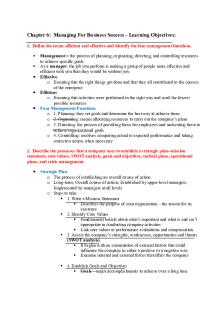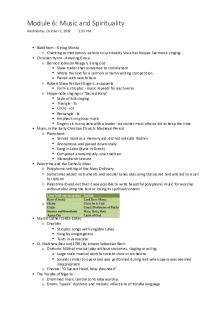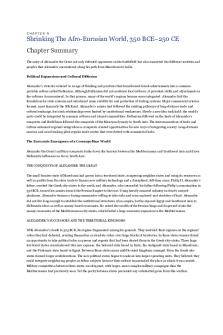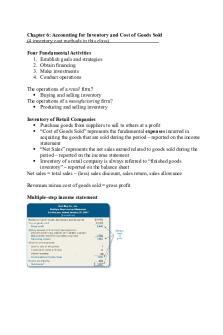Week 6 Crisis - Lecture notes 6 PDF

| Title | Week 6 Crisis - Lecture notes 6 |
|---|---|
| Course | Psychiatric-Mental Hlth Nurs |
| Institution | University of North Carolina at Charlotte |
| Pages | 4 |
| File Size | 120.3 KB |
| File Type | |
| Total Downloads | 29 |
| Total Views | 185 |
Summary
Crisis notes with Dr. Langford....
Description
Crisis Objectives 1. Define crisis and explain physiological and psychological responses to crisis 2. Describe types of crisis 3. Incorporate Aguilera’s theory to provide care for clients in crisis 4. Describe strategies to manage anger/aggression on an inpatient unit Crisis: a sudden event in one’s life that disturbs homeostasis, during which usual coping mechanisms cannot resolve the problem - We might see irritability, anxiety, shallow breathing pattern, tension Types of Crises Dispositional (situational)
Crisis of Anticipated Life Transition
Crisis Resulting from Traumatic Stress
Maturational and Developmental
Crisis Reflecting Psychopathology
Psychiatric Emergency
An acute response to an external situational stressor - A woman is beat by her husband and goes to the hospital with her baby - Not quite as unexpected Normal life-cycle transitions that may be anticipated but over which the individual may feel a lack of control - A student is placed on probation and his wife had a baby and had to quit her job and his grades begin to drop - “Life happens” and feeling lack of control Crisis precipitated by an unexpected external stressor over which the individual has little or no control and as a result of which he or she feels emotionally overwhelmed and defeated - A woman was abducted by two men with guns and beaten and now she can no longer be alone Crises that occur in response to failed attempts to master developmental tasks associated with transitions in the life cycle - A couple has a 4-month old child and one becomes diagnosed with cancer and worries she cannot address her child’s health needs A crisis that is influenced or triggered by preexisting psychopathology. Examples of psychopathology that may precipitate crises include personality disorders, anxiety disorders, bipolar disorder, and schizophrenia - A woman has borderline personality disorder and her therapist of 6 years says she is moving and now the woman is found wandering the streets distressed Crisis situations in which general functioning has been severely impaired and the individual rendered incompetent or unable to assume personal responsibility for their behavior - Includes acute suicidal idealation, drug overdoses, reactions to hallucinogens, acute psychoses, uncontrollable anger, and alcohol intoxication
Mr. Jones is a 44-year-old divorced man who recently purchased a red BMW convertible to impress his 23-year-old girlfriend. He currently complains of feeling anxious and depressed, stating, “nothing seems to make me happy.” What kind of crisis is Mr. Jones having? a. Dispositional (situational) b. Crisis of anticipated life transition c. Crisis resulting from traumatic stress d. Maturational (developmental) e. Crisis reflecting psychopathology Stress -
People with high stress are more at risk of having crises The relationship between stress and crises is cross-tolerance It is easier to handle crisis without stress than to have a stress-precipitated crisis
Stages of Crisis (Kaplan) 1. Threat results in anxiety 2. Anxiety increases 3. Anxiety escalates 4. Panic state a. Our jobs as nurses is to prevent the panic state from occurring because they can become psychotic b. Be your most directive self in crisis situation when someone is in panic state *Crises are acute and must be treated in present time Crisis Intervention - Assessment o Do a biosocial assessment o Determine how anxious they are, what their coping skills are, any support, are they suicidal or homicidal – this is not a time to learn new coping skills* o Ask them to tell you the meaning of their loss o If needed restraints – need an order every 4 hours, has to be visually seen within 1 hour by the doctor, check circulation and hydration every 15 minutes - Rapport o Listen, lean in, nod your head, look at them o Reduce stimulation - Identify precipitating event/prioritize - Validate feelings o But DON’T encourage them to focus on their feelings* - Explore options o GOAL is to restore their pre-crisis level of functioning - Implement - Follow-up o During debriefing talk about what you could’ve done better and how problems could’ve been prevented
A severely anxious client experiencing headaches, palpitations, and inability to concentrate is admitted to a medical floor. Which nursing intervention would take priority? a. Encourage the client to express feelings b. Discuss alternative coping strategies with the client c. Use a distraction, such as having the client watch a video d. Sit with the client, and use a calm but directive approach A client is exhibiting tension and needs direction to solve problems. Which intervention would the nurse implement using a behavioral approach? Select all that apply. a. Assess the client’s family history for anxiety disorders b. Encourage the client to use deep breathing techniques c. Ask the client to think of a time in the past when the anxiety was manageable d. Administer PRN lorazepam (Ativan) as prescribed The nurse is assessing clients on an in-patient psychiatric unit. Which client would require immediate intervention? a. A client who is experiencing rapid, pressured speech and poor personal boundaries b. A client experiencing homicidal ideation toward his mail carrier c. A client who has slept only 1 to 2 hours per night for the past 2 nights d. A client secluding self from others and refusing to attend groups Evaluation - Assess outcomes - Crisis may have positive outcome - Goal is to establish pre-crisis functioning and, if possible, to enhance growth o Growth is nice but not the actual goal – it’s to get the person back to pre-crisis level of functioning
A sudden event in one’s life that disturbs homeostasis, during which normal coping mechanisms cannot resolve the problem, can be defined as a? - Crisis
Group Work What do you give for IV alcohol detox? - Benzos - Fluids with B vitamins (thiamine) - Mag sulfate - Anticonvulsant (if hx of seizures) 3 factors that a person experiences during a crisis - Individuals perception of event - Available support - Adequate coping mechanisms What is the goal of crisis resolution? - Resolve immediate crisis and get back to pre-level crisis functioning What should be assessed in crisis intervention? - Assessing precipitating event - Assess physical and mental status - Have they experienced these stressors before? - Any suicidal or homicidal thoughts - Any support? - What is their pre-crisis functioning level? - What is the individual’s perception of what happened? - Check out individual’s use of substance/coping skills Name 4 possible nursing diagnoses for crisis - Ineffective coping - Powerlessness - Risk for suicide - Rape/trauma What neurotransmitter has been implemented in OCD? - Serotonin, why we treat with clomipirine and SSRI’s GABA is an excitatory neurotransmitter in the brain - False Norepinephrine is thought to be decreased in anxiety disorders - No, it is increased Antianxiety medications of benzos potentiate the effects of which neurotransmitter? - GABA What reduces the effects of anti-anxiety medications? - Cigarette smoking and caffeine...
Similar Free PDFs

Week 6 Crisis - Lecture notes 6
- 4 Pages

Week 6 - Lecture notes 6
- 20 Pages

Week 6 - Lecture notes 6
- 11 Pages

Lecture 6 - week 6
- 32 Pages

Week 6 Study Notes - week 6
- 6 Pages

Week 6 Week 6 Week 6Week 6
- 2 Pages

Week 6 Lecture
- 5 Pages

Ch 6 - Lecture notes 6
- 3 Pages

Chapter 6 - Lecture notes 6
- 5 Pages

Module 6 - Lecture notes 6
- 2 Pages

Chapter 6 - Lecture notes 6
- 6 Pages

Chapter 6 - Lecture notes 6
- 9 Pages

Anth101 6 - Lecture notes 6
- 4 Pages

Chapitre 6 - Lecture notes 6
- 2 Pages
Popular Institutions
- Tinajero National High School - Annex
- Politeknik Caltex Riau
- Yokohama City University
- SGT University
- University of Al-Qadisiyah
- Divine Word College of Vigan
- Techniek College Rotterdam
- Universidade de Santiago
- Universiti Teknologi MARA Cawangan Johor Kampus Pasir Gudang
- Poltekkes Kemenkes Yogyakarta
- Baguio City National High School
- Colegio san marcos
- preparatoria uno
- Centro de Bachillerato Tecnológico Industrial y de Servicios No. 107
- Dalian Maritime University
- Quang Trung Secondary School
- Colegio Tecnológico en Informática
- Corporación Regional de Educación Superior
- Grupo CEDVA
- Dar Al Uloom University
- Centro de Estudios Preuniversitarios de la Universidad Nacional de Ingeniería
- 上智大学
- Aakash International School, Nuna Majara
- San Felipe Neri Catholic School
- Kang Chiao International School - New Taipei City
- Misamis Occidental National High School
- Institución Educativa Escuela Normal Juan Ladrilleros
- Kolehiyo ng Pantukan
- Batanes State College
- Instituto Continental
- Sekolah Menengah Kejuruan Kesehatan Kaltara (Tarakan)
- Colegio de La Inmaculada Concepcion - Cebu

